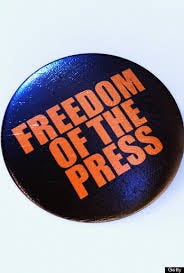Should We Ever Punish Journalists for Publishing Secret Information?

Let’s say you break into somebody’s house and steal a TV set. Then you call a friend and ask if he wants it – for free. You make him aware of how you got the TV and he says, “Sure, I’ll take it.” If the authorities find you, you and your friend are both guilty of a crime. Never mind that he didn’t break into anyone’s house. He's still guilty for knowingly accepting the stolen property.
Now let’s go to a different scenario. Let’s say you work for the United States government and have top-secret clearance. Your agency collects data – phone numbers, e-mails, and who knows what else -- on just about everybody who lives in the United States. It's being done, you're told, to catch terrorists.
Let’s say you think the government has gone too far. You think this is a violation of the United States Constitution. You are enraged because you think the U.S. government is way too nosy and you want the public to know what’s going on in secret. So you get your hands on the material, transfer it to a flash drive and offer it to a journalist who shares your opinion about the government over-reach.
In this case only the person who pilfered secret material will be prosecuted. The government has made clear that it will not prosecute journalists for publishing stolen information. Here’s how Attorney General Eric Holder put it to a Senate committee: "The Department has not prosecuted, and as long as I’m attorney general, will not prosecute any reporter for doing his or her job."
Let’s get the obvious out of the way: Burglars don’t have First Amendment protection and journalists do. So this is not a prelude to an argument about punishing journalists who publish information the government wants to keep secret.
In fact, if the decision were mine, I would not prosecute Glenn Greenwald, the journalist who published the National Security Agency information about “data-mining” -- secret information that was leaked to him by Edward Snowden. Nor would I attempt to punish James Rosen of Fox News who reported secret information about North Korea presumably leaked to him by a federal employee. And I would not punish the New York Times journalists, either, for publishing secret information that might have helped terrorists during the George W. Bush administration.
I think, as does just about every other journalist, that even if reporters wind up giving the bad guys a heads up about what the U.S. government is doing to catch them, we have to give the press a lot of leeway. In the long run, we figure, we’ll all be better off if the news media can keep the public informed, even if the government wants to keep us in the dark. Supreme Court Justice Felix Frankfurter put it this way: "Freedom of the press is not an end in itself but a means to an end of achieving a free society." Dictatorships and other authoritarian regimes, after all, are the ones who jail reporters for exposing government secrets.
But let's go to one more scenario. What happens if the next government employee with top-secret clearance learns that the CIA, under orders from the President of the United States, is on the ground, in secret of course, trying to destabilize a country whose government we don’t like?
And what happens if that U.S. government employee thinks this is wrong and wants the world to know? What happens if he leaks his information to a friendly journalist?
If it gets out that CIA agents are on the ground in this unfriendly country they may very well be killed. Most responsible journalists, I think, would not publish the information – even if they thought the underlying story was newsworthy. Most journalists would not put American agents in mortal danger for a scoop. (I know that some on the hard right think this is naïve. Let’s just say reasonable people may disagree.)
But in a world of mass information, of a million Web sites and blogs, there’s a good chance that someone would publish the secrets and possibly cause the deaths of those American undercover agents.
So what do we do then? The leaker, of course, would be prosecuted -- but what about the journalist? Remember, the attorney general said he would not prosecute a journalist "for doing his or her job."
Okay, I grant you this is not only a hypothetical, but perhaps it’s a wild one at that. But journalists take it as an attack on nothing less than the Constitution of the United States, motherhood and apple pie, if someone so much as brings up a question about the role of the press in the matter of publishing secret information – except to say freedom of the press guarantees their independence.
So if the next Edward Snowden happens to be the one who leaks secrets about CIA agents we'll then find out what the American people think about the independence of journalists – and about the limits of the First Amendment.
After all, if the leaker has caused serious harm to our country by single-handedly de-classifying secret information, why aren’t journalists also causing serious harm by disseminating that information? And if they are, what should the country do about it?










